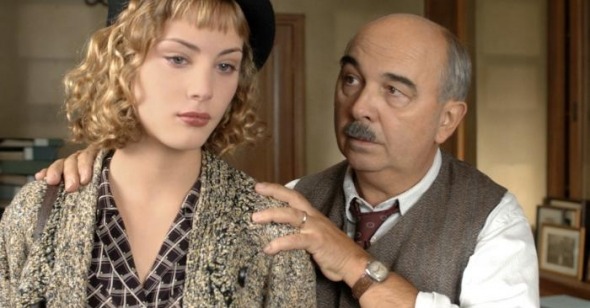Nostalgia Factory
by Michael Joshua Rowin
Paris 36
Dir. Christophe Barratier, France, Sony Pictures Classics
Staking its success on a vibrant reproduction of 1930s Paris and a surfeit of nostalgic charm, Paris 36’s homage to a milieu and cinema of the past aims for let’s-put-on-a-show razzmatazz but disappointingly settles on being not much more than a pretty, pleasant diversion. The retro-classical pieces are all in place in a plot inspired by countless underdog musicals set in the tinsel and sawdust of showbiz: a ragamuffin music hall troupe comprised of suicidal divorcees, radical organizers, and likable, unfunny comedians; a tense political backdrop to the music hall’s financial straits; a pretty ingénue torn between a working class hero and a greedy mob boss; and the redemption of lives and careers through the power of art. But the paint-by-numbers approach never really adds up. While more endearingly human and less obnoxiously pomo than something like Moulin Rouge, Paris 36 just doesn’t have the dramatic chops to match its aspirations.
Paris 36 (originally titled Faubourg 36) begins on New Year’s Eve 1935 at the Cansonia music hall in a quasi-fictional north Paris neighborhood where stout, hangdog stage manager Pigoil (Gérard Jugnot) discovers his star wife, Viviane (Elisabeth Vitali), is having an affair. At the same time the theater owner is offed by unctuous, scheming mob boss and fascist party mercenary Galapiat (Bernard-Pierre Donnadieu), who shuts down the entertainment palace and gives its ragtag crew pink slips. Familial and artistic crises intertwine—over the next year Pigoil’s efforts to win back beloved, street singing son Jojo (Maxence Perrin) from his now upwardly mobile, remarried wife coincide with the fortunes of the music hall, which Pigoil leads in reestablishing with a new star attraction, the beautiful singer Douce (Nora Arnezeder), to hopefully buy it back for good.
Writer-director Christophe Barratier, whose previous effort was his enormously successful 2004 debut Les Choristes, works in subplots touching upon the political environment of Depression-era France, most notably in the Popular Front unionizing of Jewish idealist stagehand Milou (Clovis Cornillac) and the brief sell-out gig taken up by Fozzie Bear–style comedian Jacky (Kad Merad), who performs disgusting anti-Semitic caricatures for Galapiat’s fascist gatherings. Yet they’re only there to provide the illusion of intellectual heft to what is simplistic good guys versus bad guys stuff, the kind of historical drama that superficially references the turmoil and complexities of the past while looking back on it with a fondness for the retro-comfort of its clearly demarcated “sides.”
Fans of the musical genre (resurgent without being creatively fecund for a decade now) may try not to mind—Paris 36 boasts dazzling period décor and costumes and some debuting eye candy (the film is supernaturally radiant Arnezeder’s first), even if its over-accentuated crane shots and earnestly executed but musically uninfectious centerpiece montage of increasingly elaborate production numbers (built on the songs of Reinhardt Wagner and Frank Thomas) fall short of fostering the buoyancy the film strains to achieve. Thus, if Barratier can’t be blamed for sincerity he can be blamed for trying too hard—Paris 36 possesses not only a crippling self-conscious naiveté but an overflowing of plot strands so hastily resolved at film’s end that a poignant reunion between Douce and her former songwriter-turned shut-in father (Pierre Richard) and Pigoil’s bittersweet fulfillment of a lifelong dream to see the sea feel like mere afterthoughts. Ultimately Paris 36 is a disappointing case of a film so in love with tradition that it tries in vain to hit every generic marker without taking the time or care to do them justice.
This article originally appeared on indieWIRE.
